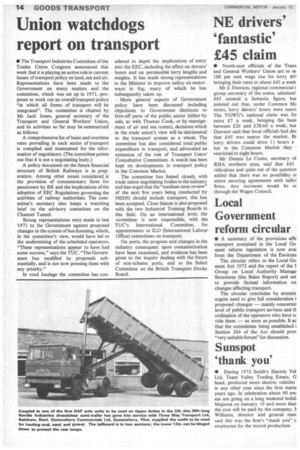Union watchdogs report on transport
Page 16

If you've noticed an error in this article please click here to report it so we can fix it.
• The Transport Industries Committee of the Trades Union Congress announced this week that it is playing an active role in current issues of transport policy on land, sea and air. Representations have been made to the Government on many matters and the committee, which was set up in 1971, proposes to work out an overall transport policy "in which all forms of transport will be integrated". The committee is chaired by Mr Jack Jones, general secretary of the Transport and General Workers' Union, and its activities so far may be stmunarized as follows: A comprehensive list of basic and overtime rates prevailing in each sector of transport is compiled and maintained for the information of negotiators. (The committee points out that it is not a negotiating body.) A policy document on the future financial structure of British Railways is in preparation. Among other issues considered is the provision of concessionary fares for pensioners by BR and the implications of the adoption of EEC Regulations governing the activities of railway authorities. The committee's secretary also keeps a watching brief on the advisory committee on the Channel Tunnel.
Strong representations were made in late .1971 to the Government against proposed changes in the system of bus licensing, which, in the 5ommittee's view, would have led to the undermining of the scheduled operators. "These representations appear to have had some success," says the TUC. "The Government has modified its proposals substantially, and is not now pressing them with any priority."
In road haulage the committee has con sidered in depth the implications of entry into the EEC, including the effect on drivers' hours and on permissible lorry lengths and weights. It has made strong representations to the Minister to improve safety on motorways in fog, many of which he has subsequently taken up.
• More general aspects of Government policy have been discussed including, objections to Government decisions to hive-off parts of the public sector (either by sale, as with Thomas Cook, or by reassignment of air and sea routes), decisions which in the trade union's view will be detrimental to the transport system as a whole. The committee has also considered total public expenditure in transport, and advocated an extension of the role of Transport Users' Consultative Committees. A watch has been kept on developments in transport policy in the Common Market.
The committee has liaised closely with trade union negotiating bodies in the industry and has urged that the "medium-term review" of the next five years being conducted by NEDO should include transport; this has been accepted. Close liaison is also proposed with the two Industrial Training Boards in this field. On an international level, the committee is now responsible, with the TUC's International Committee, for appointments to ILO (International Labour Office) committees on transport.
On ports, the progress and changes in the industry consequent upon containerization have been examined, and evidence has been given to the inquiry dealing with the future of non-scheme ports, and to the Select Committee on the British Transport Docks Board.








































































































